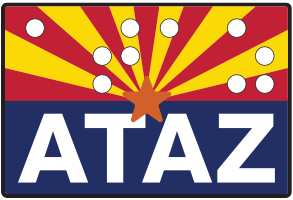PDF 674kb, 2 pages
Arizona Business Enterprise Program (BEP)
The Business Enterprise Program (BEP) was created following the enactment of the Randolph-Sheppard Act of 1936, 20 USC 107 et. seq., as amended in 1954 and 1974. The 1936 act was enacted to provide people who are blind with remunerative employment, enlarge their economic opportunities, and encourage their self-support through the operation of vending facilities in federal buildings. State laws have expanded the business opportunities into municipal, county, and state buildings as well.
What is the Business Enterprise Program (BEP)?
This Rehabilitation Services Administration program, in a close partnering relationship with rehabilitation services administration's Vocational Rehabilitation program (VR), offers people who are legally blind the opportunity to become independent entrepreneurs. By participating in the program as “blind vendors”, they are assisted in reaching their fullest potential as business people within the guidelines of the Business Enterprise Program.
How does BEP work?
The Vocational Rehabilitation (VR) Counselor places the individual, following evaluation, in a formal training program which includes management practices, foodservice and vending operations, retailing, marketing, sanitation, accounting, small business management, and personnel functions among others. Upon satisfactory completion of this extensive training and licensing, the individual may apply for placement in a BEP facility.
How is BEP funded?
There are currently no state funds required to support the program, however Vocational Rehabilitation counselors work closely with the BEP and support potential operators through the application, screening, and selection process. All funding is derived from vending machine income, operator's contributions based on a percentage of their facility profits, as well as matching funds from federal programs and grants.
What concepts or locations are included in program?
- Cafeterias
- Snack Bars
- Branded Concepts
- Micro-Markets
- Highway Rest Stop Vending
- Corrections Vending
- Coffee Kiosks
- Military dining
- Office Coffee Service
- Private Vending
"Revenues benefit the blind and visually impaired." Federal Law: 20 U.S.C. § 107 et seq. State Law: A.R.S. § 23-504 www.azdes.gov/rsa/sbvid/bep
What kinds of locations are BEP facilities located in?
- Federal buildings
- State buildings
- County buildings
- Municipal buildings
- Military Bases
- Military Entrance Centers
- Military Training centers
- Private businesses
Randolph Sheppard Facts
- The Federal Randolph Sheppard Act, 20 U.S.C. § 107, Mini Randolph Sheppard Act, Arizona Revised Statutes 23-504, and the Federal Interstate Highway Act, Title 23, Chapter 1, Subchapter I, Sec. 111. govern the program. Arizona has a very strong “Mini Randolph Sheppard” act providing priority for state, county, and municipal buildings in Arizona, similar to the federal law.
- The Vending Facility program authorized by the Randolph-Sheppard Act provides persons who are blind with remunerative employment and self-support through the operation of vending facilities on federal and other property. The program was intended to enhance employment opportunities for trained, licensed blind vendors to operate facilities. The law was subsequently amended in 1954 and again in 1974 to ultimately ensure individuals who are blind a priority in the operation of vending facilities, which included cafeterias, snack bars, and automatic vending machines on federal property. The program priority has broadened through state laws to include state, county, municipal, and private locations as well. Under the Randolph Sheppard program, state licensing agencies recruit, train, license, and place individuals who are blind as operators of vending facilities located on federal and other properties. The act authorizes a blind individual licensed by the state licensing agency to conduct specified activities in vending facilities through permits or contracts.
- In Arizona the program operates under the Arizona Department of Economic Security. The US Department of Education monitors and consults with programs at the federal level.
- The BEP is responsible for identifying potential business opportunities, negotiating contracts with facility grantors, designing and equipping the facility, as well as providing initial stocks and supplies. The facilities and operators are regulated and monitored by the BEP, which also provides ongoing consultation, monitoring, and management services.
- The blind operators, as independent business owners, work full time in their businesses, and contribute to the local economy through taxes and job creation. BEP operators employee over 200 people state wide, and in addition to the 30+ people who work blind as operators, many of their businesses employ people with disabilities.
What qualifications do I need to become a BEP Operator?
- Candidate must be legally blind
- Candidate must be a citizen of the United States
- Candidate must be at least 18 years of age
- Candidate must be a client of Vocational Rehabilitation (VR)
The VR Counselor and BEP will assist the candidate as they complete the 8-step application process. Once the application file is completed, a screening committee will determine acceptance into the training program. The training program is 6-9 months in duration, and provides trainees a solid foundation for operations management and many of the courses can lead to certification from the National Restaurant Education Foundation.
Where can I get more information?
- Randolph-Sheppard Vendors of America (randolph-sheppard.org)
- National Association of Blind Merchants (blindmerchants.org)
- US Department of Education (ed.gov)
- National Federation of the Blind (NFB) (nfb.org)
- National Council of State Agencies for the Blind (ncsab.org)
Arizona Business Enterprise Program
3425 E Van Buren
Phoenix, Arizona 85008
www.azdes.gov/rsa/sbvid/bep
(602)774-9101
 ATArizona.com
ATArizona.com 